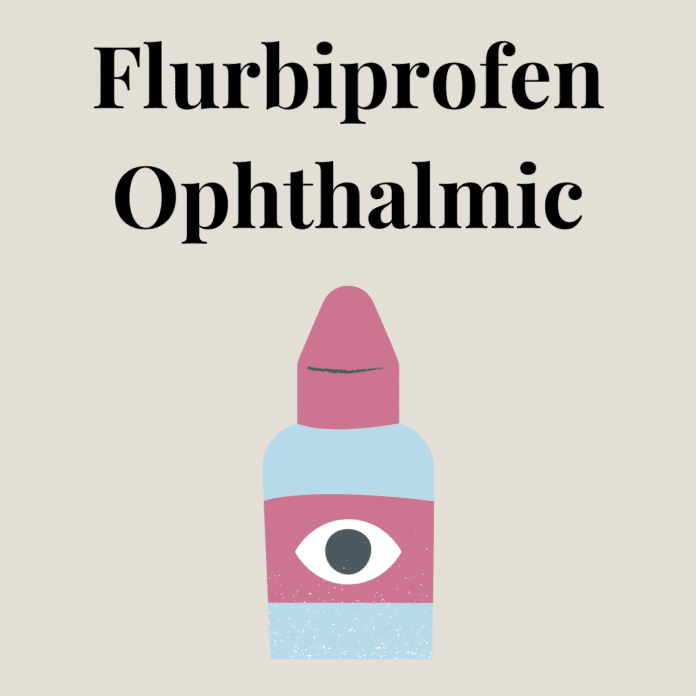Uses of Flurbiprofen Ophthalmic
Flurbiprofen ophthalmic is used to prevent or reduce changes in the eye that may occur during eye surgery. Flurbiprofen ophthalmic is in a class of medications called nonsteroidal anti-inflammatory drugs (NSAIDs). It works by stopping the release of certain natural substances that cause pain and swelling.
Side Effects Of Flurbiprofen Ophthalmic
Flurbiprofen eye drops may cause side effects. Tell your doctor if any of these symptoms are severe or do not go away:
- stinging or burning of the eyes
- an increase or decrease in size of the pupil (dark area in the center of the eye)
- Some side effects can be serious. If you experience any of these symptoms, call your doctor immediately:
- bleeding within the eye
- sensitivity to light
- eye pain
- blurry, cloudy, or blocked areas of vision
Warnings & Precautions
Before taking flurbiprofen ophthalmic eye drops:
- tell your doctor and pharmacist if you are allergic to flurbiprofen, aspirin, or any of the ingredients in flurbiprofen eye drops. Ask your pharmacist for a list of the ingredients.
- tell your doctor and pharmacist what other prescription and nonprescription medications, vitamins, nutritional supplements, and herbal products you are taking or plan to take. Be sure to mention any of the following: anticoagulants (‘blood thinners’) such as warfarin (Coumadin); aspirin; nonsteroidal anti-inflammatory agents, such as celecoxib (Celebrex), diclofenac (Voltaren), etodolac (Lodine), fenoprofen (Nalfon), flurbiprofen (Ansaid), ibuprofen (Advil, Motrin, Midol), indomethacin (Indocin), ketoprofen (Orudis, Oruvail), ketorolac (Toradol), meclofenamate, mefenamic (Ponstel), nabumetone (Relafen), naproxen (Aleve, Naprosyn), oxaprozin (Daypro), piroxicam (Feldene), sulindac (Clinoril), and tolmetin (Tolectin); and eye drops such as acetylcholine chloride (Miochol E) and carbachol (Miostat, Isopto Carbachol).
- tell your doctor if you have or have ever any condition that causes you to bleed easily.
- tell your doctor if you are pregnant, plan to become pregnant, or are breast-feeding.
- you should know that flurbiprofen eye drops may slow the healing of the eye after surgery. Call your doctor right away if your pain and swelling do not improve.
Flurbiprofen Ophthalmic Dosage
Flurbiprofen ophthalmic comes as a solution (liquid) to instill in the eyes. It is usually instilled in the eye(s) undergoing surgery every 30 minutes beginning 2 hours before surgery for a total of four doses. Use flurbiprofen ophthalmic exactly as directed. Do not take more or less of it or take it more often than prescribed by your doctor.
To instill the eye drops, follow these steps:
- Wash your hands thoroughly with soap and water.
- Check the dropper tip to make sure that it is not chipped or cracked.
- Avoid touching the dropper tip against your eye or anything else; eye drops and droppers must be kept clean.
- While tilting your head back, pull down the lower lid of your eye with your index finger to form a pocket.
- Hold the dropper (tip down) with the other hand, as close to the eye as possible without touching it.
- Brace the remaining fingers of that hand against your face.
- While looking up, gently squeeze the dropper so that a single drop falls into the pocket made by the lower eyelid. Remove your index finger from the lower eyelid.
- Close your eye for 2 to 3 minutes and tip your head down as though looking at the floor. Try not to blink or squeeze your eyelids.
- Place a finger on the tear duct and apply gentle pressure.
- Wipe any excess flurbiprofen ophthalmic solution from your face with a tissue.
- Replace and tighten the cap on the dropper bottle. Do not wipe or rinse the dropper tip.
- Wash your hands to remove any medication.
Other
Keep all appointments with your doctor.
It is important for you to keep a written list of all of the prescription and nonprescription (over-the-counter) medicines you are taking, as well as any products such as vitamins, minerals, or other dietary supplements. You should bring this list with you each time you visit a doctor or if you are admitted to a hospital. It is also important information to carry with you in case of emergencies.
Source
All information on lurbiprofen ophthalmic solution has been provided courtesy of MedLinePlus from the National Library of Medicine and from the FDA.



